Keeping combat organized in tabletop RPGs can be challenging, but the right initiative tracker can make it much easier. Whether you prefer classic tools like pen and paper or advanced digital solutions, there's an option for every playstyle. Here's a quick rundown of the top 10 initiative tracking methods:
- Pen and Paper: Simple, reliable, and perfect for small groups.
- Spreadsheets: Customizable and great for handling complex encounters.
- Hero Muster: Mobile-friendly with system-specific templates.
- Improved Initiative: Web-based automation for faster gameplay.
- D&D Beyond Combat Tracker: Official tool with character sheet integration.
- HarmlessKey.com: Free and browser-based with accessibility features.
- Roll20 Combat Tools: Built-in for virtual tabletop users.
- Foundry VTT Modules: Highly customizable for tech-savvy GMs.
- Physical Initiative Cards: Hands-on, screen-free tracking.
- Mobile Apps: Portable and versatile for on-the-go tracking.
Each tool offers unique features like automatic sorting, condition tracking, or integration with popular systems like D&D and Pathfinder. Below, you'll find a detailed comparison of these tools to help you choose the best fit for your game.
The Best Initiative Method for Your RPGs
1. Basic Pen and Paper Method
The pen and paper method remains a favorite, with 37% of DMs choosing it, according to RPGBot.net [2]. Its appeal lies in how straightforward it is to use.
To get started, create a table with columns for initiative roll, character name, HP, and status effects. Here's how you can use it:
- Write down initiative rolls in descending order. Use color-coding to differentiate between PCs and NPCs. Leave space for late arrivals to the battle and track each round separately.
"The pen and paper method's reliability and ease of use consistently outperforms digital alternatives", says Calvin Moore, founder of RPGBot [2].
You can enhance this method by using color-coding, abbreviating names, and leaving blank rows for flexibility. Mark the active turn clearly to keep things organized. While this approach works well for most games, it can become tricky to manage during large encounters or multi-phase battles with more than five players. In such cases, combining it with physical tools might help [7].
This method provides a solid starting point for exploring more advanced tools later.
2. Spreadsheet Templates
Spreadsheets bring a digital edge to initiative tracking while keeping things simple and familiar. It's no surprise that 42% of Game Masters rely on spreadsheet-based tools for managing their campaigns [3].
Platforms like Google Sheets and Excel come with templates that streamline combat management. These templates can automatically sort combatants by initiative rolls, saving time and cutting down on delays during gameplay [3].
What can these templates do?
- Automatically sort initiative order
- Track conditions with dropdown menus
- Update HP totals in real time
- Advance turns automatically
- Allow collaborative access for players
"The integration of dropdown menus for status conditions like 'Prone' or 'Concentrating' has reduced our combat resolution time by 40% compared to traditional methods", says Calvin Wright, lead developer at RPGBot [1].
Tips to level up your spreadsheet game:
- Freeze header rows to keep essential info visible while scrolling.
- Use shortcuts (like Ctrl+Enter) to update fields quickly.
- Organize encounters into separate tabs for better clarity [5][2].
More advanced templates can even handle damage calculations and help plan for multiple encounters [9]. Plus, they can sync with virtual tabletops like Roll20, thanks to data-sharing features [8].
Spreadsheets are a great middle ground for GMs juggling complex combat scenarios. They offer a smooth transition from pen-and-paper methods to fully digital solutions. If you're ready to take it a step further, dedicated tools like Hero Muster (covered in the next section) provide even more system integration.
3. Hero Muster
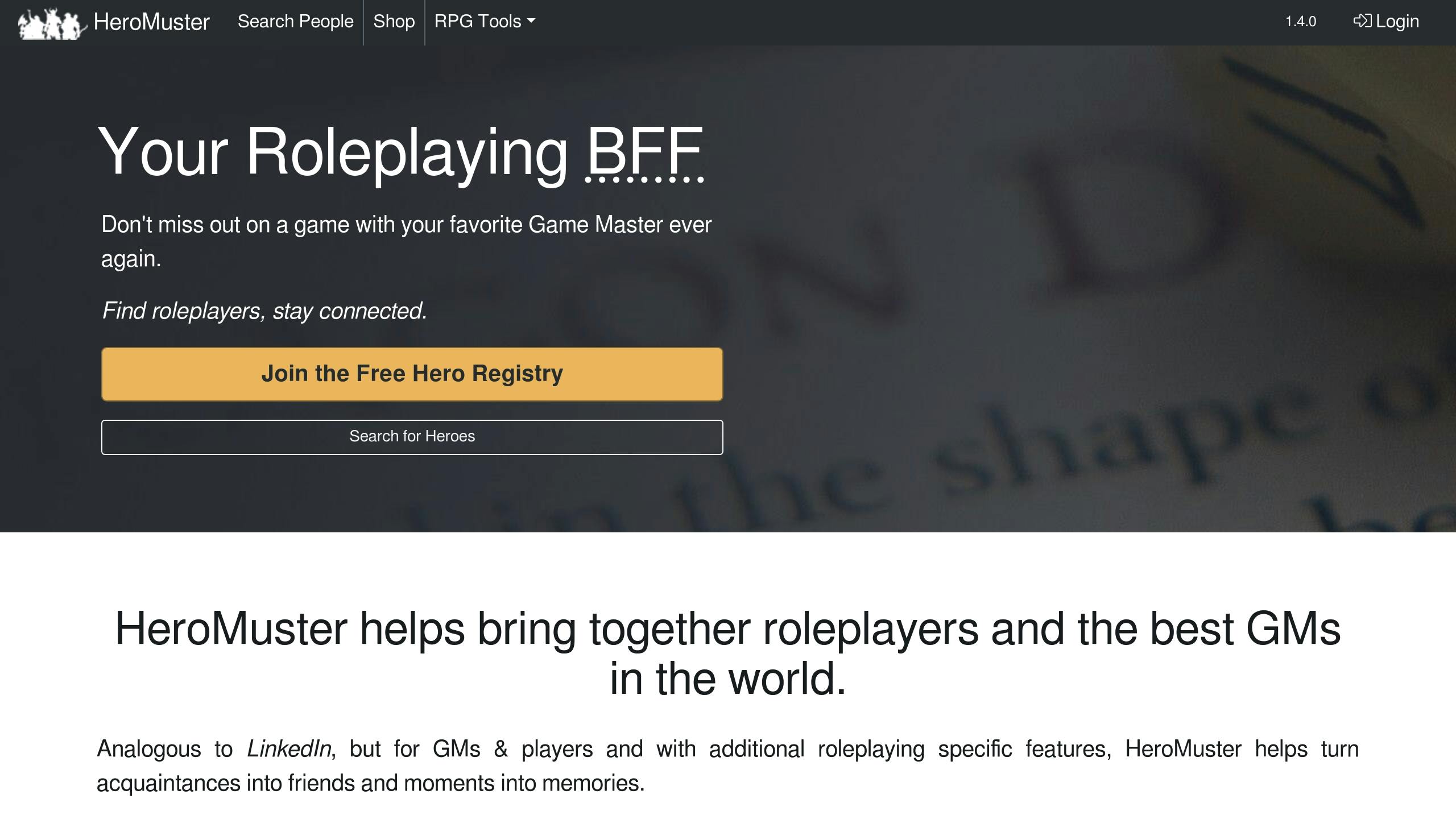
Hero Muster takes the best parts of spreadsheets while sidestepping their drawbacks, offering a tool designed for tracking initiatives with ease. Its mobile-first approach and compatibility across multiple systems make it a standout option for Game Masters.
Key Features for Combat Management:
- Initiative calculations based on bonuses
- Real-time tracking of status conditions
- Rules tailored to specific systems
Hero Muster works seamlessly with over 10 TTRPG rulesets, such as D&D 5e's static bonus system and Shadowrun's dynamic round-based initiatives [3]. This makes it ideal for Game Masters juggling different systems.
The platform's mobile-first design includes Bluetooth syncing across devices and a reliable offline mode, ensuring smooth gameplay even without internet access [3].
Customizable System Templates
Hero Muster provides templates tailored to various game mechanics, including:
- D&D 5e with DEX-based initiative calculations
- Pathfinder’s intricate initiative system
- White Wolf games' unique combat structures [3]
"Players track turns on their phones instead of asking 'Who's next?'"
Its tablet-optimized displays combine the clarity of physical tools with the benefits of digital features [9]. This is especially useful for groups moving from traditional methods to digital tools but not ready for full virtual tabletops.
For large-scale combat encounters, the quick-swap feature lets Game Masters shift between battles without losing track of conditions or effects [2]. This directly addresses the challenges of managing complex encounters with pen-and-paper systems.
4. Improved Initiative
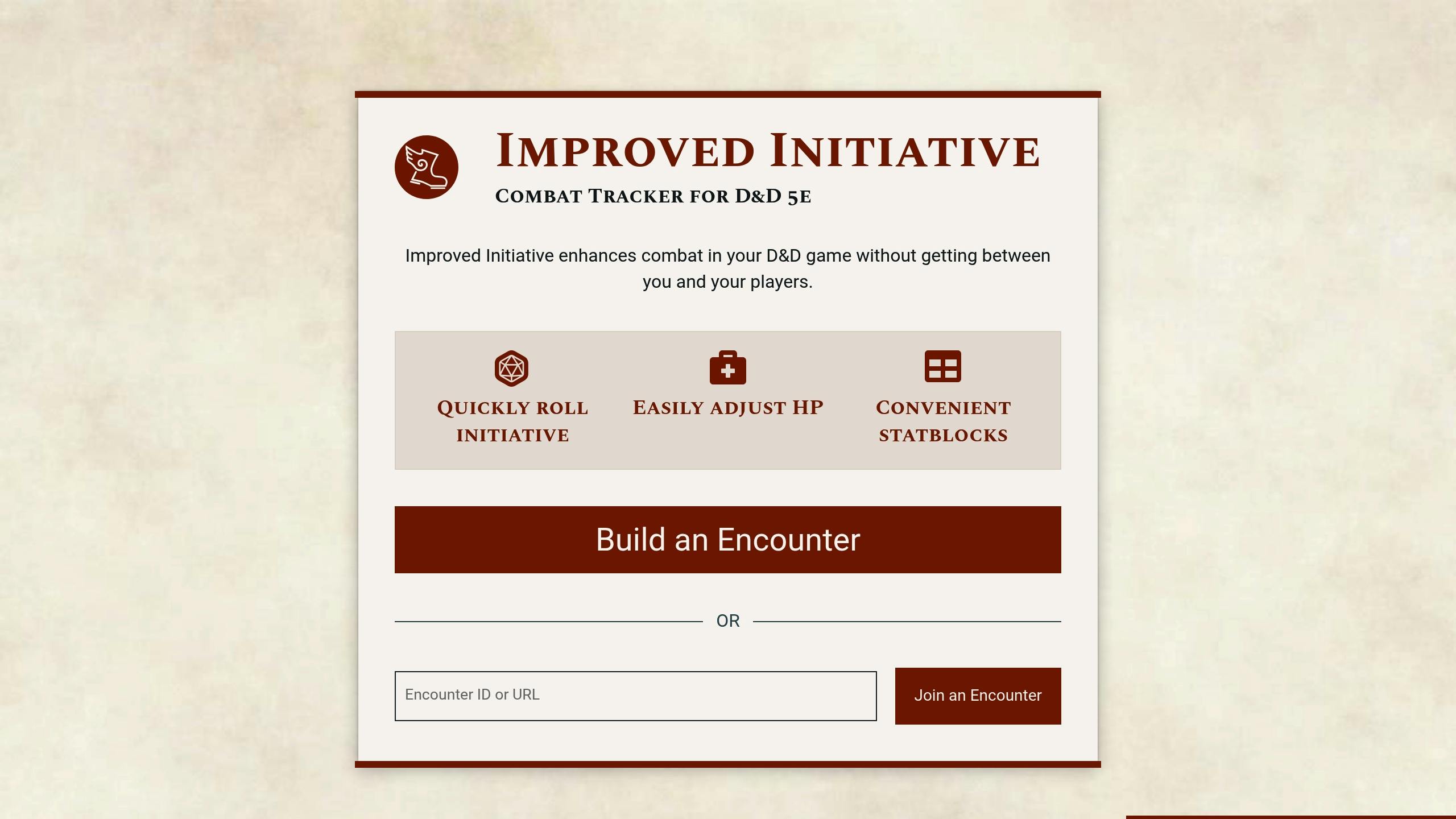
Improved Initiative takes Hero Muster's mobile-friendly concept and expands it into a web-based tool designed for GMs seeking deeper system integration. Available at dm.tools/tracker, this initiative tracker has an impressive rating of 4.7/5 stars from 237 Chrome Web Store reviews [5].
Key Combat Features
This platform simplifies combat management with powerful tracking tools. It automates damage calculations, factoring in creature resistances and vulnerabilities, and supports mass initiative rolls for groups of identical enemies [3][10]. These features tackle the common frustrations of manual tracking often encountered in traditional pen-and-paper systems.
System Compatibility
Improved Initiative works seamlessly with D&D 5e, Pathfinder, and offers customizable templates for other systems thanks to its system-agnostic design [3]. This adaptability makes it a great choice for GMs running campaigns across various tabletop RPG systems.
Offline Access
Unlike many tools that require constant internet access, Improved Initiative uses browser caching to work offline [10].
"The offline functionality has been a game-changer for our remote location sessions. No more combat delays due to connectivity issues." [10]
The user-friendly interface also includes customizable audio and visual alerts for status effect expiration [10]. However, some users have noted occasional performance hiccups during very large combat scenarios [5]. While its system-agnostic approach provides excellent automation, the lack of direct character sheet integration might be a drawback for some GMs [6].
If you're looking for a tool with direct character sheet integration, the next section on D&D Beyond might offer a better fit.
5. D&D Beyond Combat Tracker
D&D Beyond's Combat Tracker is a key tool for managing Dungeons & Dragons 5th Edition campaigns. As part of the official D&D digital suite, it syncs directly with character sheets and automates combat management. This integration makes it especially useful for groups already using D&D Beyond, addressing the lack of direct character sheet syncing found in tools like Improved Initiative.
Subscription Features
To access the full range of features, you'll need a Master Tier subscription, which costs $5.99 per month or $59.88 annually [6]. This unlocks advanced automation tools designed to streamline gameplay.
Integrated Digital Tools
What makes this tracker stand out is its direct sync with character sheets and monster stats. It automatically retrieves and updates key information such as:
- Initiative modifiers
- Hit points, including temporary HP
- Condition immunities
- Saving throw bonuses
- Special abilities and spells
Mobile-Friendly Design
With a 4.7/5 rating from over 39,600 App Store reviews [4], the mobile app offers a smooth experience for both DMs and players. However, it does require an internet connection for syncing, which may limit its use compared to offline tools [10].
Performance Insights
The tool performs well for small to medium-sized encounters but may experience slowdowns when managing 13 or more combatants [2].
Automation Perks
With a subscription, you gain access to features like:
- Automatic initiative rolls
- Condition duration tracking
- Death save management
- Spell slot tracking
- Concentration checks [11]
While it might not be as flexible for homebrew content as some open-source options [10], its official integration with D&D 5e content makes it a solid pick for those already using the D&D Beyond platform.
6. HarmlessKey.com
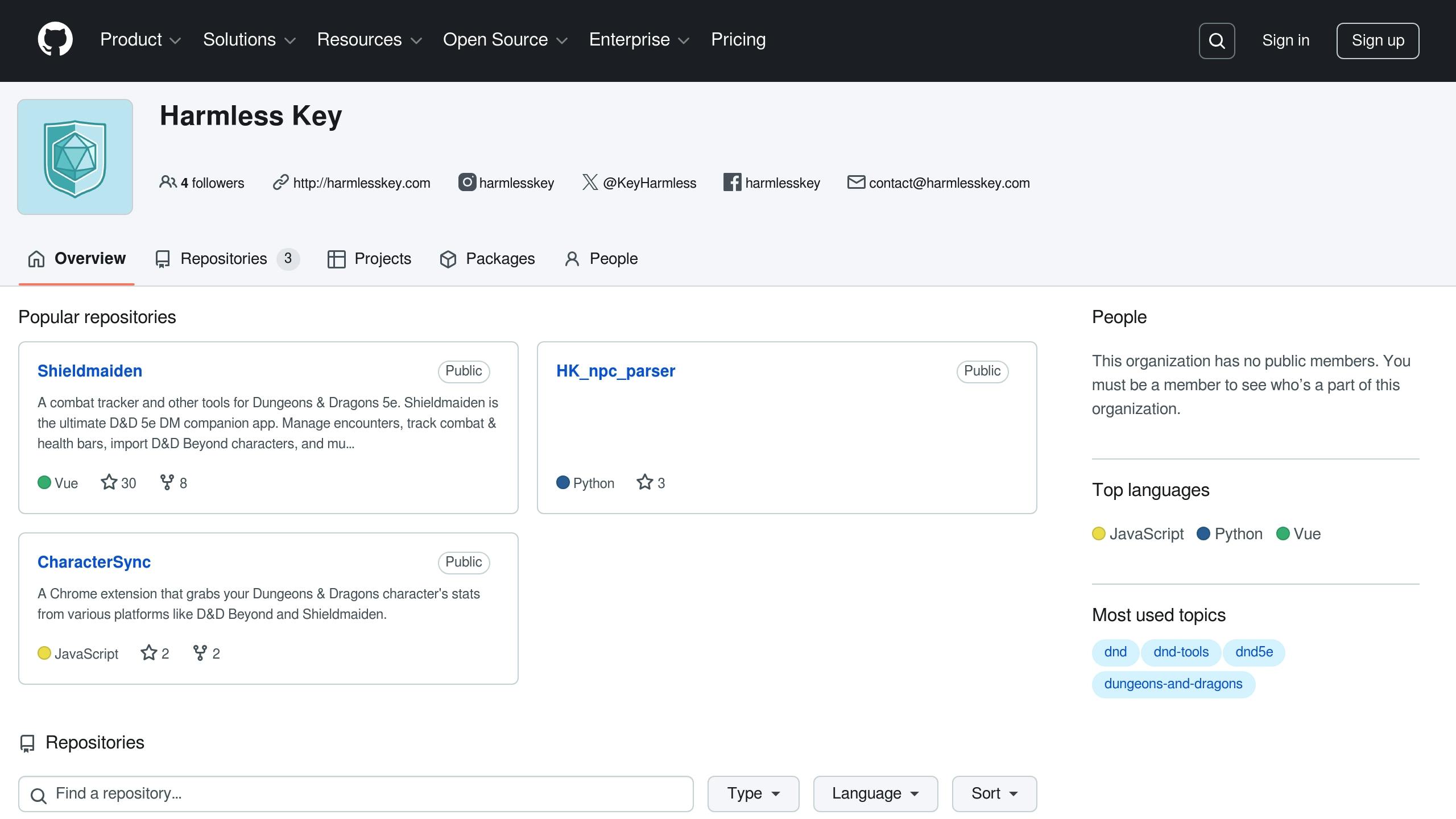
HarmlessKey.com is a go-to option for GMs who want a subscription-free alternative to D&D Beyond. With over 10,000 users as of 2023 [5], this web-based tool simplifies combat tracking by offering features like:
- Automatically sorted initiative with clear visual turn indicators
- Timers for system-specific conditions
- Fog-of-war controls to manage enemy visibility [3][1]
Core Features
HarmlessKey.com shines with its automated combat management tools. It takes care of tricky calculations, offering:
- Real-time initiative sorting with color-coded turn highlights
- Timers for managing spells and status effects
- Customizable rule templates for D&D 5E and Pathfinder 2E
- Fog-of-war settings to control what players can see [3][1]
Performance and Accessibility
With 92% uptime [3], HarmlessKey.com ensures your sessions run smoothly. Its browser-based design allows for:
- Instant access without the need for downloads
- Low data usage for better performance
- Mobile-friendly displays
- Separate views tailored for GMs and players [6]
Integration Capabilities
The platform connects with D&D Beyond via JSON imports and integrates with Foundry VTT using webhooks [3][1].
Pricing Structure
HarmlessKey.com offers a freemium plan that supports up to 6 combatants for free. For $5/month, users get access to unlimited campaigns and advanced tracking features [4].
User Experience
Users praise its easy-to-use interface and quick setup for combat encounters. The dual-screen mode is especially popular, giving GMs detailed stat blocks while keeping things simple for players [9].
Additional features like browser-based audio integration and tools for immersive encounters enhance traditional initiative tracking methods with the precision of digital tools [3].
sbb-itb-b8b00a5
7. Roll20 Combat Tools
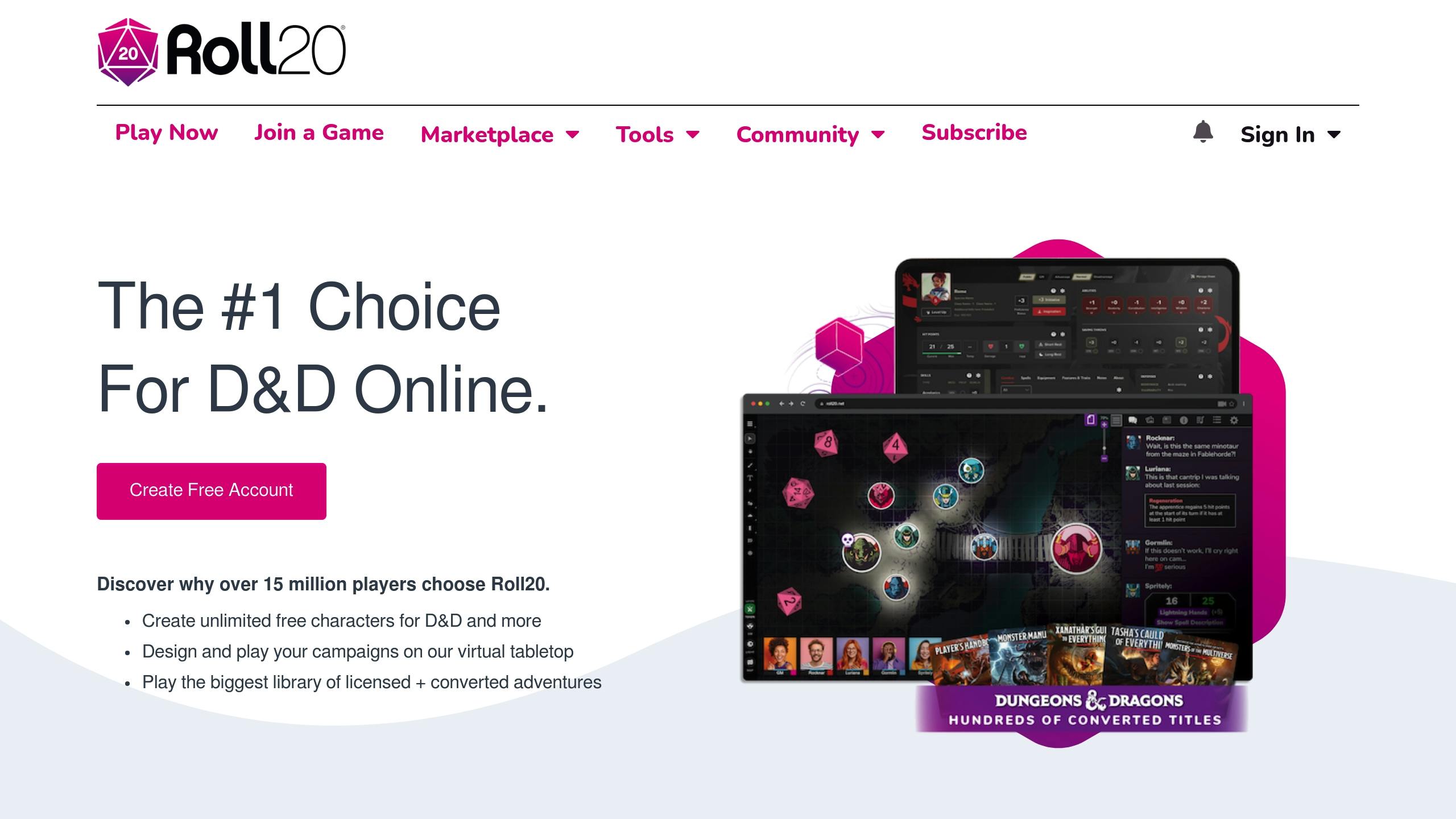
If your group already uses virtual tabletops, Roll20's combat tools offer built-in tracking features that work seamlessly with its platform. These tools are designed to integrate directly with Roll20's virtual tabletop environment, keeping combat organized and flowing smoothly.
Core Features
Roll20 integrates with character sheets to calculate initiative modifiers for D&D 5E automatically. For other systems, you’ll need to input bonuses manually.
Combat Management Tools
Here are some key tools to make managing combat easier:
- Automatic initiative rolls for selected tokens
- One-click options to add or remove combatants
- Simplified automation for combat actions
- Direct connections to character stats and modifiers
Premium Capabilities
Pro-tier subscribers ($9.99/month) unlock extra tools, such as:
- Custom scripting for advanced automation
- Integration with dynamic lighting
- More options for character sheet customization [2]
Technical Considerations
Roll20 does have its limitations. It doesn’t support a mobile app, and automation for tracking conditions is limited [3]. Additionally, complex encounters - especially those involving many tokens with effects - can sometimes cause lag [9].
Integration Benefits
Roll20’s marketplace lets GMs import pre-made adventures. These come with ready-to-use combat encounters and enemy stat blocks, saving time and effort [2].
Optimization Tips
To speed up play, set up custom macros for frequently used actions. The 'Reroll Initiative' feature is also handy for resetting combat [4].
While Roll20 provides an easy-to-use system, platforms like Foundry VTT (discussed next) offer more advanced customization options.
8. Foundry VTT Modules
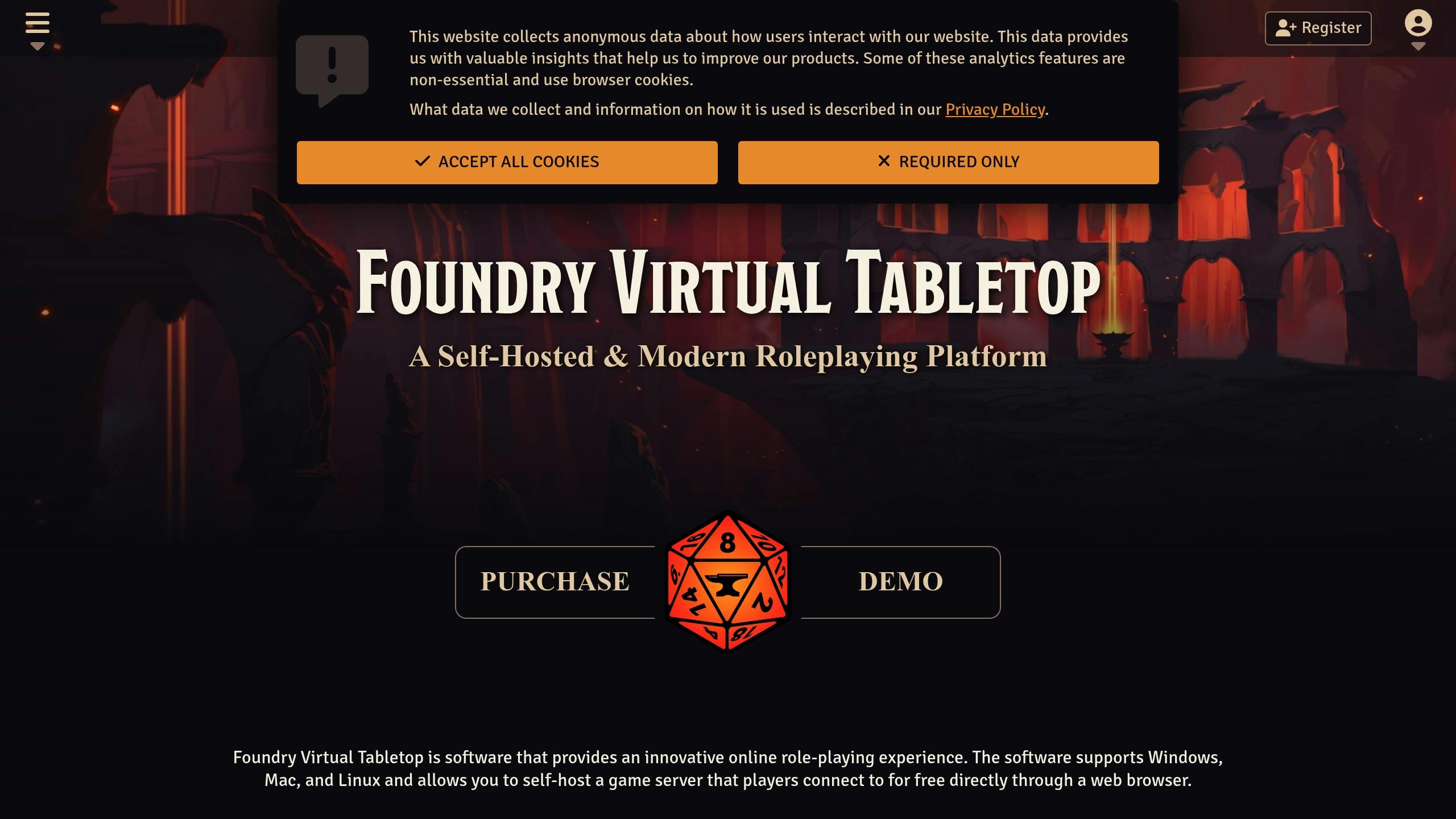
Foundry Virtual Tabletop offers a flexible system for tracking initiative, thanks to its modular approach.
Core Initiative Features
- Handles decimal-based initiative values (e.g., 20.5 for lair actions).
- Automatically pulls initiative bonuses from character sheets.
- Accounts for special modifiers like the Alert feat's +5 bonus [3].
Top Combat Modules
Combat Carousel upgrades the default initiative tracker with a sleek radial design. With a 4.8/5 rating and over 12,000 downloads, it's a favorite for its clear visuals - especially popular with streaming shows [10].
Combat Enhancements adds advanced tools, including:
- Speed-based initiative options.
- Turn highlighting to keep players focused.
- Integration of status effects.
- Automated tracking for conditions.
Turn Marker places visual cues directly on the battlefield map, making it easier to track who's up next in combat [10].
Customization and Automation
Foundry's API allows users to tailor the system to fit various game mechanics. In fact, 68% of users adopt at least one combat module to improve their sessions [10]. Automation tools have drastically cut down setup time for combat - from 9 minutes to just 2 [9].
Boosting Performance
Tackle complex encounters with tools like:
- Combat Booster, which simplifies HP and initiative displays.
- Group Initiative, perfect for tracking parties as a whole.
- Mid-QOL, which automates condition management [3].
Tablet-Friendly Features
Though Foundry VTT is primarily desktop-focused, the TouchVTT module refines the interface for tablet users, making it more accessible [1].
"The Foundry community wiki documents 17 specific initiative-related conflict resolutions" [10][11].
These resources can help fine-tune your tracking setup.
While Foundry's digital tools are impressive, some groups may still prefer physical solutions for certain gameplay elements. Stay tuned for the next section.
9. Physical Initiative Cards
Even in an era dominated by digital tools, physical initiative cards hold their ground, with 28% of groups opting for screen-free gaming sessions [1]. Here’s a closer look at some of the popular choices:
High-End Commercial Options
Laser-Cut Wooden Boards
TheC4Labs offers laser-etched initiative boards priced at $32. These boards feature numbered slots and sturdy construction. Their 2024 model even includes round counter beads for tracking turns more effectively [1].
Magnetic Dry-Erase Systems
The Tabletop RPG Initiative Trackers Set A is a standout. It includes magnetic dry-erase cards and metal bases, making it easy to update statuses or rearrange during gameplay [12].
Cost-Friendly DIY Ideas
For those on a budget, standard playing cards can be repurposed. Add colored clips to represent conditions, creating a simple yet effective solution [7].
Hybrid Designs
Some commercial sets blend features like:
- Sliding tokens for managing turns
- Detachable icons for tracking conditions
- Built-in tools for status updates [2]
"The combination of tactile engagement and zero tech reliance makes physical initiative cards irreplaceable for many gaming groups" [1].
Tips for Effective Use
- Keep slots limited to 10-12 combatants for clarity.
- Include removable markers for conditions.
- Test writing surfaces before your session begins [9][12].
These physical tools strike a balance between hands-on interaction and practical organization, paving the way for the next category: mobile apps.
10. Mobile Initiative Apps
Mobile apps bring the simplicity of physical cards to your fingertips while offering precise and portable tools for managing combat.
Combat Counter Mobile stands out as a versatile option for tracking initiative and managing encounters across various gaming systems. It includes features like bonus-based rolls and tools designed to adapt to different tabletop RPG (TTRPG) systems [3].
Key Features to Know
Combat Management Tools
- Sort initiative in ascending or descending order.
- Track HP for each combatant.
- Support for rules across multiple systems.
Availability Across Platforms
While Combat Counter Mobile is primarily developed for Android, plans for an iOS version are in the works [3].
Popular Apps and Their Highlights
Several mobile apps cater to different TTRPG needs, each offering specialized features:
| App | Features | Ideal For |
|---|---|---|
| Initiative Tracker for D&D | Stat block integration, condition tracking | D&D 5e-focused games |
| Game Master 5th Edition | Character sheet sync, multi-encounter storage | Campaign management |
| Encounter+ | Map integration, automated initiative | Visual combat tracking |
Integration Features
Although direct API connections are not yet standard, Combat Counter Mobile allows manual importing of stat blocks. This feature is especially helpful for groups juggling multiple tools during a session [3].
"The combination of quick-entry stat blocks and encounter data saving makes Combat Counter Mobile particularly effective for maintaining game flow during complex encounters" [3].
Tips for Smooth Usage
To ensure everything runs smoothly during live sessions:
- Clear saved encounters regularly.
- Export your data monthly to avoid clutter.
- Set up quick-access buttons for frequently used actions [7].
With these mobile tools, GMs have a powerful option to balance accessibility and automation, complementing everything from analog methods to fully digital setups.
Tool Comparison Chart
Here's a side-by-side look at the main differences between analog and digital tools:
| Tool Name | Price | Platform | Key Features | Best For |
|---|---|---|---|---|
| Basic Pen & Paper | Free | Physical | Manual tracking, no tech needed | Classic gameplay, backup solution |
| Spreadsheet Templates | Free | Desktop/Web | Custom formulas, sorting options | GMs needing flexible tracking |
| Hero Muster | Free - Premium | Mobile | Designed for mobile use | Groups focused on mobile tools |
| Improved Initiative | Free - $5/month | Web | Customizable interface | Online D&D sessions |
| D&D Beyond Combat Tracker | Free - $5.99/month | Web | Official D&D toolset | D&D Beyond users |
| HarmlessKey.com | Free | Web | Screen reader support, accessibility | Inclusive gaming groups |
| Roll20 Combat Tools | Free - $49.99/year | Web | VTT integration, multi-system compatibility | Virtual tabletop users |
| Foundry VTT Modules | $50 one-time | Desktop | Modular customization | Tech-savvy GMs |
| Physical Initiative Cards | $30-50+ | Physical | Tactile components, no tech dependency | Groups preferring hands-on tools |
| Combat Counter Mobile | Free | Android | Multi-system support, offline functionality | Android users on the go |
Specialized Capabilities
Each type of tracker has its strengths:
| Feature Category | Basic Tools | Mid-Range Solutions | Premium Options |
|---|---|---|---|
| Game Mechanics | Simple notes | Status markers, duration tracking | Full VTT integration |
| Integration | None | Character sheet import | Advanced digital toolset integration |
| Accessibility | Varies | Basic screen reader support | Optimized screen reader features |
Platform Compatibility Matrix
Knowing which platforms are supported can help you pick the right tool for your needs:
| Platform | Number of Compatible Tools |
|---|---|
| Web Browser | 5 |
| Mobile Devices | 3 |
| Desktop Apps | 2 |
| Physical Format | 2 |
Web-based tools dominate, with half of the options offering browser access. That said, physical tools remain a favorite for their simplicity and tactile experience. This breakdown helps guide your choice based on your group's preferences and tech comfort level.
Summary and Recommendations
After analyzing 10 tracking methods, here’s how different tools align with specific play styles:
For In-Person Games
Stick to physical tools and straightforward tracking methods for tabletop sessions. These keep the focus on the game and ensure everything remains visible at the table without unnecessary tech distractions.
For Online Sessions
Virtual Tabletop (VTT) platforms are ideal here. Foundry VTT offers modular features for detailed customization (check Section 8 for more). On the other hand, Roll20 is a solid choice for larger groups, thanks to its streamlined interface.
For Hybrid Games
Web-based trackers like Improved Initiative shine in mixed setups. They provide features such as:
- Shared initiative displays
- Mobile-friendly access
- Real-time updates for all players
For New Game Masters
If you’re just starting out, try Hero Muster. Its free mobile interface is easy to use, and you can explore premium features once you’re comfortable.
For Mass Combat Management
Handling large-scale battles? Digital tools can simplify the chaos. Foundry VTT modules and Combat Counter Mobile are excellent for managing multiple combatants efficiently.
For Accessibility Needs
For inclusive play, HarmlessKey.com is a standout option, offering screen reader compatibility to accommodate diverse player needs.
Budget Considerations
- Free Options: Spreadsheets or basic features of tools like Improved Initiative.
- Subscription-Based: D&D Beyond starts at $5.99/month.
- One-Time Purchase: Foundry VTT costs $50 for lifetime access.
As highlighted in the Platform Compatibility Matrix, web-based tools provide flexible solutions for modern gaming groups. These recommendations aim to answer the critical question: How can you effectively track initiative in D&D and other systems?
FAQs
How to keep track of initiative in D&D?
Tracking initiative in D&D can vary depending on group size and the format of your sessions:
For tabletop sessions, many groups use a mix of physical cards (see Section 9) and digital notifications to ensure both players and the DM stay informed.
For larger combat encounters involving 10 or more participants, digital tools are usually the easiest way to manage everything efficiently. Check out Sections 2 and 10 for tips on how to set these up.
When you encounter initiative ties, here are some options:
- Compare DEX scores, as outlined in the official rules.
- Use digital tools that handle ties automatically.
- Stick to physical tracking methods if that suits your group better (details in Sections 6 and 9).
Pro Tip: Keep combat moving smoothly by encouraging players to plan their actions before their turn comes up [7].
For systems that require per-round initiative rerolls (like AD&D 2e), apps designed for quick rerolling are your best bet [3]. If your system involves tracking detailed conditions, tools with condition markers (see Sections 3 and 8) will make your life much easier.


